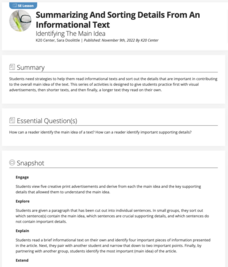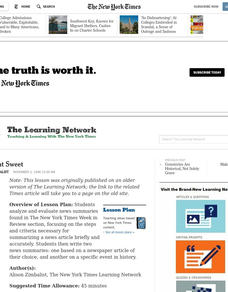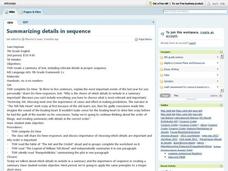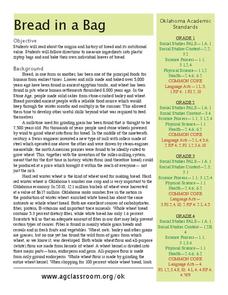Curated OER
Retell And Summarize Text
Help your learners read a text and summarize it using their own words. The main idea and important details of an article are discussed before individuals write their summaries. To support discernment about what to include in a summary,...
Polk Bros Foundation
How to Summarize a Non-Fiction Passage
After reading a text, one way to find out how much your class comprehended is to ask your pupils to summarize. This worksheet helps class members prepare for writing a summary of a nonfiction text. They note down the topic, up to eight...
Baruch College Writing Center
Summarizing, Paraphrasing, and Quoting Workshop
What's the difference between summarizing and paraphrasing? Show class members how to find the main ideas from informational text and condense it, restate it, or quote it directly with a series of educational activities based...
cordovla.weebly.com
Summarizing, Paraphrasing and Quoting
How skilled are your class members at summarizing, paraphrasing, and quoting from a text? Find out with this assessment that asks readers to identify the thesis statement, the summary, the paraphrases, and the quoted material in an...
Student Achievement Partners
"The Glorious Whitewasher" from The Adventures of Tom Sawyer by Mark Twain with Mini-Assessment
It's the classic scene: Tom Sawyer is whitewashing a fence. Expose your learners to Mark Twain's humor while reinforcing reading comprehension. Eighth graders are encouraged to read and reread, achieving as much exposure to the text...
Ontario
Reading Informational Text
Learning to recognize the importance of the features of information text (i.e., titles, subtitles, endnotes, sidebars, etc.) is the focus of a reading activity designed for middle schoolers. Learners examine how these text features...
Curated OER
Introduce: Summarizing Narrative Text
When scholars re-tell a story, do they boil it down to important details in a logical order? Practice summarizing narratives using this think-aloud strategy, which is scripted here for your convenience. After explaining why this is an...
Orange County Schools
Piggybook
Summarizing text is a balancing act between being brief but thorough. You need to be short and to the point, but also cover all the important details, a task that presents a challenge for many young learners. In this lesson based on the...
Curated OER
Whittle, Whittle it Down: Summarizing
Middle schoolers summarize a one to two page article of informational text. They compose a summary according to the guidelines on the "Five Rules for Writing a Summary" chart. They take turns reading their summary to the group, and...
Scholastic
Summarizing: Using Hand Motions for Key Words or Points
Learning to summarize texts takes practice. Jump into the training ring and guide your learners through a summarizing practice session. The classic direct instructional practice of "I do, you do, we do" is used to help them identify key...
Mary Pope Osborne, Classroom Adventures Program
The Backpack Travel Journals
Strap on those backpacks, it's time to travel through history with this literature unit based on the first four books of The Magic Tree House series. While reading through these fun stories, children create story maps, record...
Polk Bros Foundation
Comprehensive Nonfiction Reading Questions
Analyze any nonfiction text with the set of questions on this sheet. Class members practice inferring by noting the main idea and purpose of a passage. They also analyze an opinion in the passage and write a brief summary. See the...
K20 LEARN
Summarizing and Sorting Details from an Informational Text: Identifying the Main Idea
Scholars participate in two activities that teach them to identify the main idea and key supporting details in informational text. Partners create a visual that reflects the main idea and key supporting details in an informational text...
E Reading Worksheets
Summarization and Narrative Sequence
Readers are asked to identify seven important events in a narrative and then to explain why these events are key to the story. To conclude the activity, kids craft a summary using their list.
Curated OER
Short and Sweet Science
Readers learn how to summarize scientific text and evaluate the advantages, disadvantages, and challenges in writing summaries. They select science-related articles you've pulled and collected from the New York Times and, with a partner,...
Curated OER
Short But Sweet
After analyzing and evaluating news summaries found in the New York Times "Week in Review" section, middle schoolers study the steps for summarizing a news article briefly and accurately. They write two news summaries: one on a newspaper...
Polk Bros Foundation
I Can Analyze a Story or History Completely and Carefully
Start off analysis of a text with a worksheet that asks pupils to complete several tasks. Class members note down a couple of characters or people and their distinguishing traits, describe the most important event, summarize the text...
Curated OER
Let's Summarize!
Students, after brainstorming what summarization is, practice the strategy of summarization to help pick out the important parts of text each time they read. They read and summarize the article, "10 Cool Things About Dolphins," from the...
Curated OER
Summarizing Details in Sequence
Seventh graders write a few sentences explaining the most important events of their lives during the past year. As a class, they discuss why they chose the elements they did for their sentences. To end the lesson plan, they read a...
Curated OER
Only the Facts
Practice the strategy of summarizing to gain meaning and knowledge from an informational text. Young readers highlight supporting details and main ideas, and then they use this to summarize two articles: "The Great Quake" and "What...
Curated OER
Summarizing Key Information
Imagine the surprise when small groups present their Evidence Charts to the class and discover that each group has studied a different version of the Cinderella story. Irish, Ojibwa, Egyptian, Chinese, Korean, Persian, Mexican, and...
Polk Bros Foundation
A Way to Analyze Paragraphs to Figure Out the Main Idea of a Nonfiction Text
Shrink up a section by asking pupils to write down the main idea for each of seven paragraphs. There is a space provided for each main idea. When students have completed this portion, they write down what they think to be the central...
Curated OER
Bread in a Bag
Could the history of bread really be interesting? Yes, it could! An informational text gives scholars wheat production background from 8,000 years ago, discussing different types of bread and the current industry in Oklahoma. Learners...
Florida Center for Reading Research
Comprehension: Monitoring for Understanding, Simple Summary
Can your class sum up a text in a few sentences? Help them build this skill by starting nice and slow. For this summarizing activity, the teacher marks the main ideas with sticky notes. Learners read and reread the text, pausing at the...
Other popular searches
- Summarizing Text Worksheets
- Free Summarizing Text
- Summarizing Text 3rd Grade
- Summarizing Text 2nd Grade
- Summarizing Text Samples
- Summarizing Text 7th Grade
- Summarizing Text Activities
- Summarizing Text Sheets
- Summarizing Text Content
- Summarizing Text Key Points
- Summarizing and Text Structure
- Text Comprehension Summarizing

























